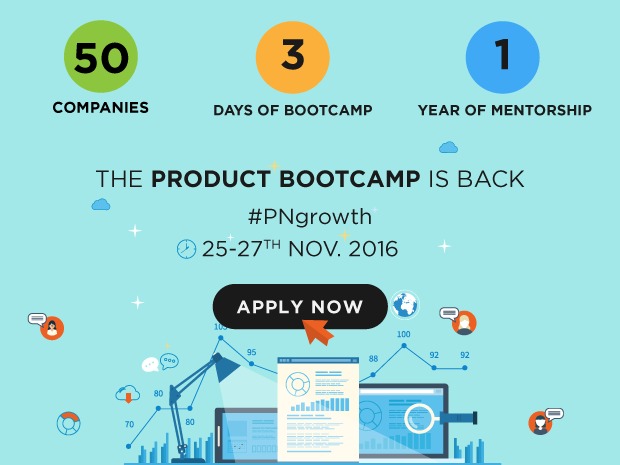We’ve done this for two years. It has been successful. But we still felt that it could be improved. We went back to the drawing board. We thought hard about how we could do this better.
And we’ve come back with something that will be more powerful, and even more demanding from our product entrepreneurs.
#PNgrowth2016 will feature only 50 startups, giving each startup more facetime with the mentors, more scrutiny, and more learning. Reducing the number also means that the quality of the startups attending will also go up, thereby making peer to peer learning and networking even more valuable.
 So 50 Companies. 3 Days of Bootcamp. 1 Year of Mentorship.
So 50 Companies. 3 Days of Bootcamp. 1 Year of Mentorship.
The Product Bootcamp is back. Smaller, better, more intense. Apply now!
Who is #PNgrowth for, and who is it not for?
PNgrowth2016 is a program to help companies chase ‘Good Scale’ i.e. achieve high growth AND increase in quality. Achieving Good Scale is a critical first step to a company achieving Category Leadership.It will be a year long program comprising of selecting around 50 companies who will go through a three day bootcamp, followed up with monthly mentoring sessions to track progress over the next 12 months.
The idea behind #PNgrowth2016 is to identify companies who can be significantly impacted with Mentoring and put them together in an intense environment to accelerate their learning curve. It is not meant for companies who are:
-
Well funded, have their business model figured out and have access to business inputs and sufficient mentors.
-
Companies who are in survival mode, are wondering whether they will survive the next six months or don’t yet have a working product and some initial customers.
How will the format be?
The inputs to the companies will come from structured frameworks provided to them and from intense practice of these frameworks as it applies to their individual cases. During these practice sessions, they will get relevant feedback from their peers, and from experienced Mentors. The feedback will help them improve their thinking and the structure (including metrics) will allow them and their Mentors to judge the progress being made over the next 12 months.
What happens in the three day bootcamp?
-
You might have heard of a Product Teardown? #PNgrowth2016 starts off with a three day bootcamp for your business model. It is an intensive ‘business model’ teardown for entrepreneurs, by entrepreneurs.
-
To begin with, you will be provided with a structure along with frameworks and metrics which you will apply on your own business.
-
There will be three main sessions (each lasting 4 hours or more) – Market (Demand), Product (Supply) and Product-Market fit.
Across these three sessions, your business model will first be torn down and rebuilt. Along the way, will be questioned on every assumption you have made about your customers, your product, metrics, your business etc (maybe even about yourself)!
You will also get feedback on your efforts from peers – you will be in a cohort of 12 other entrepreneurs. These fellow entrepreneurs will be in your cohort throughout the three days, and for the rest of the year (Think iSPIRT RoundTables)
You will get feedback from Mentors who are practitioners of the science and art of building companies – VCs, experienced entrepreneurs, specialists in Product, Marketing and Sales, Finance. There will be two mentors assigned to each cohort of 12, and there will be around 4 cohorts in all.
There are three formats of learning we’ve planned:
- VC or ‘Judgment’ – Where your business is judged by those who might want to invest in you and their judgement is a kind of feedback for you to refine your business model.
- Sage on Stage or ‘Teaching’ – Knowledge from experts whose experiences inspire or instruct you to refine your business model.
- Guide by the Side or ‘Learn by doing’. You get relevant feedback and insights on your own efforts from peers and mentors that are directly applicable to refining your business model.
- PNgrowth will be 85% of ‘Guide by side’, 10% of ‘Sage on stage’ and 5% of Judgement model. Your output is proportional to the effort you put in. There is no passive learning.
At the end of the bootcamp, based on all the business model tear down and rebuilding, you will walk out with the top metrics of interest for you, your goals for those metrics over the next three, six and twelve months, and your choices and actions to reach those metrics. The metrics will enable you to progress check in monthly meetings/calls with Mentors and your cohort group.
The preparation for bootcamp will begin with the curation process itself. You will start answering the very simple set of questions that will be repeated throughout #PNGrowth2016 – What is your hypothetical customer Bob’s problem that you are solving (Market-Demand), how are you solving it (Product-Market fit) so that you can have a scalable, sustainable Business Model which allows you to achieve ‘Good scale’ and positions you on the track to Category Leadership.
And since there are only 50 slots, you should start now!

